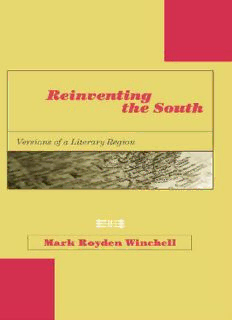
Reinventing the South: Versions of a Literary Region PDF
Preview Reinventing the South: Versions of a Literary Region
Reinventing the South Reinventing the South Versions of a Literary Region C Mark Royden Winchell University of Missouri Press Columbia and London Copyright © 2006 by The Curators of the University of Missouri University of Missouri Press, Columbia, Missouri 65201 Printed and bound in the United States of America All rights reserved 5 4 3 2 1 10 09 08 07 06 Library of Congress Cataloging-in-Publication Data Winchell, Mark Royden, 1958– Reinventing the South : versions of a literary region / Mark Royden Wichell p. cm. Summary: “Surveys the revivification and reinvention of southern culture and literature, and the influence of the Agrarians, Fugitives, New Critics, and popular writers, including John Gould Fletcher, Robert Penn Warren, Monroe K. Spears, Walter Sullivan, William Faulkner, Tennessee Williams, William Humphrey, and Cormac McCarthy”—Provided by publisher. Includes index. ISBN-13: 978-0-8262-1618-2 (alk. paper) ISBN-10: 0-8262-1618-8 (alk. paper) 1. American literature—Southern States—History and criticism. 2. Southern States—Intellectual life—1865– 3. Southern States— In literature. 4. Regionalism in literature. I. Title. PS261.W56 2006 810.9'975—dc22 2005027898 ™This paper meets the requirements of the American National Standard for Permanence of Paper for Printed Library Materials, Z39.48, 1984. Designer: Stephanie Foley Typesetter: Crane Composition, Inc. Printer and binder: Thomson-Shore, Inc. Typeface: ITC Century Book For Walter Sullivan Contents Preface ix Part One: The Nashville Renascence 1. This Land Is Your Land 3 2. Arkansas Traveler 10 3. Renaissance Man 22 4. The Legacy of Monroe K. Spears 42 5. Incarnate Words 76 6. “What They Have to Say about Us” 104 Part Two: The Lower South 7. The Faulkner Wars 127 8. Family Values in Go Down, Moses 134 9. WhyStreetcarKeeps Running 161 10. Come Back to the Locker Room Ag’in, Brick Honey! 176 11. The Achievement of William Humphrey 189 12. Scum of the Earth 223 Index 243 Preface I n one sense, what follows is a random selection of essays writ- ten over the past twenty years or so. In the midst of this seeming randomness, however, there is an implicit pattern, which says much about the phenomenon we choose to call modern southern lit- erature. By now, the myth of the Southern Renascence has become numbingly familiar. Prior to the War between the States, the South had had a flourishing culture—if not equal in total output to that of New England, then at least competitive and certainly distinctive in character. Then, in the fallow decades after Appomattox, the south- ern people devoted almost all their energies to keeping body and soul together. Former aristocrats were impoverished by Emanci- pation and Reconstruction, while poor whites and freed blacks tend- ed to do even worse. The leisure provided for some by a slave econ- omy was gone, and with it the arts had seemed to disappear. As late as 1920, H. L. Mencken could say of Dixie: In that gargantuan paradise of the fourth-rate there is not a sin- gle picture gallery worth going into, or a single orchestra capa- ble of playing the nine symphonies of Beethoven, or a single opera house, or a single theater devoted to decent plays. . . . Once you have counted Robert Loveman (an Ohioan by birth) and John McClure (an Oklahoman) you will not find a single southern poet above the rank of a neighborhood rhymester. Once you have counted James Branch Cabell (a lingering sur- vivor of the ancien regime: a scarlet dragonfly imbedded in opaque amber) you will not find a single southern prose writer who can actually write. And once you have—but when you come to critics, musical composers, painters, sculptors, archi- tects and the like, you will have to give it up, for there is not even a bad one between the Potomac mud-flats and the Gulf. Nor an historian. Nor a sociologist. Nor a philosopher. Nor a theologian. Nor a scientist. In all these fields the south is an ix
Description: